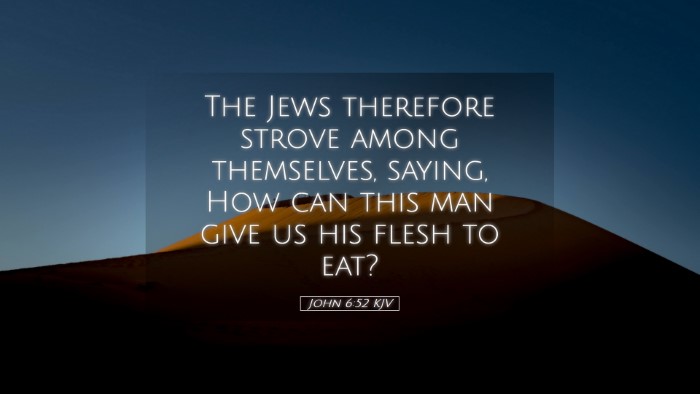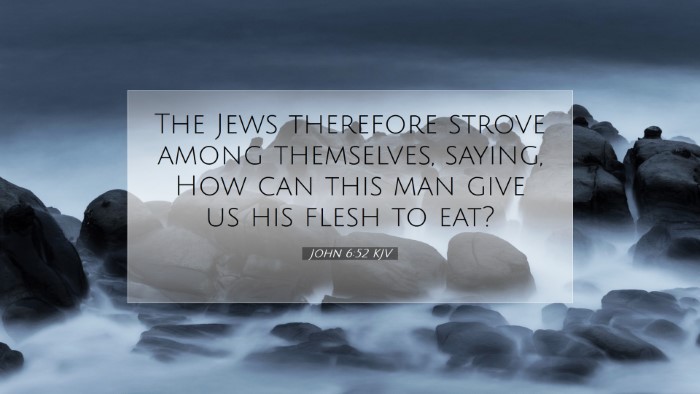Commentary on John 6:52
Verse: "The Jews therefore strove among themselves, saying, How can this man give us his flesh to eat?" (John 6:52)
Introduction
This verse encapsulates a pivotal moment in the discourse of Jesus regarding the Bread of Life. It reflects the confusion and struggle of the Jewish audience in grappling with the profound implications of Jesus' teaching. The commentaries by Matthew Henry, Albert Barnes, and Adam Clarke provide a rich tapestry of insights that deepen our understanding of this passage.
Contextual Background
John 6 opens with the miraculous feeding of the five thousand, which sets the stage for Jesus’ declaration of Himself as the Bread of Life. After the miraculous sign, the crowd follows Jesus, seeking more miraculous provision. The previous verses establish a theme of spiritual sustenance versus physical sustenance, leading to the contentious debate reflected in verse 52.
Analysis of the Text
The Struggle of Understanding
As Henry notes, the Jews' agitation in this verse reveals their materialistic mindset. They grapple with the literal interpretation of Jesus’ words concerning eating His flesh. This struggle exemplifies how spiritual truths can often be misinterpreted through human understanding.
Symbolism of Flesh and Blood
Barnes emphasizes the symbolic nature of "flesh" and "blood" in Jesus' teachings. In the Jewish context, the consumption of flesh represented a deep, intimate participation in the life and ministry of Christ. This is further illuminated by the connections to the Passover and the sacrificial system of Israel, where blood and flesh held significant spiritual connotations.
Christological Implications
Clarke provides a rich exploration of the Christological implications of this verse. He points out that the phrase "give us his flesh to eat" signals an invitation to partake in the very life of Christ. It foreshadows the institution of the Lord's Supper, where believers are called to partake of Christ both spiritually and physically through the elements.
Theological Reflections
The Nature of Faith
Henry asserts that the Jews' disbelief stems from an absence of faith. Their struggle reflects the broader human experience of wrestling with divine truths that transcend earthly understanding. This calls forth a response of faith that is not rooted in mere rational comprehension.
Communion with Christ
Barnes emphasizes that the act of 'eating' symbolizes the believer's communion with Christ. Just as physical food is essential for sustenance, so too Jesus’ words and presence are necessary for spiritual life. This established the foundational understanding of Christian communion.
The Challenge of Spiritual Insight
Clarke warns that many remain blinded to the deeper meanings of Christ’s words; they cling mistakenly to literal understandings. This serves as a cautionary note for contemporary readers, reminding us to seek the spiritual truths embedded within Jesus’ teachings, rather than being ensnared by superficial interpretations.
Pastoral Applications
Encouraging Spiritual Hunger
Pastors can use this text to encourage congregants to cultivate a hunger for spiritual things. The response of the Jews illustrates a common barrier—being preoccupied with earthly concerns rather than divine sustenance. Sermons can drive home the point that genuine faith often requires moving beyond our initial perceptions.
Emphasizing the Importance of Communion
Theological education and preaching should stress the significance of communion with Christ. As believers partake of the Lord's Supper, they embody the truth of Jesus’ teaching. Pastors should emphasize this sacrament as a means of grace to nourish the believer’s journey in faith.
Engaging with Doubts
In light of the Jews’ struggle, ministers can create a space for honest questioning and wrestling with doubt. Acknowledging that doubts and struggles do not negate faith can help believers understand their own journeys with greater clarity.
Conclusion
John 6:52 serves as a crucial reminder of the profound depths of Jesus’ proclamation as the Bread of Life. The insights drawn from public domain commentaries invite readers—whether scholars, pastors, or students—to delve deeply into the rich theological and pastoral implications of this scripture. Comprehension of these truths requires faith, discernment, and an openness to the mystery of God’s revelation in Christ.


